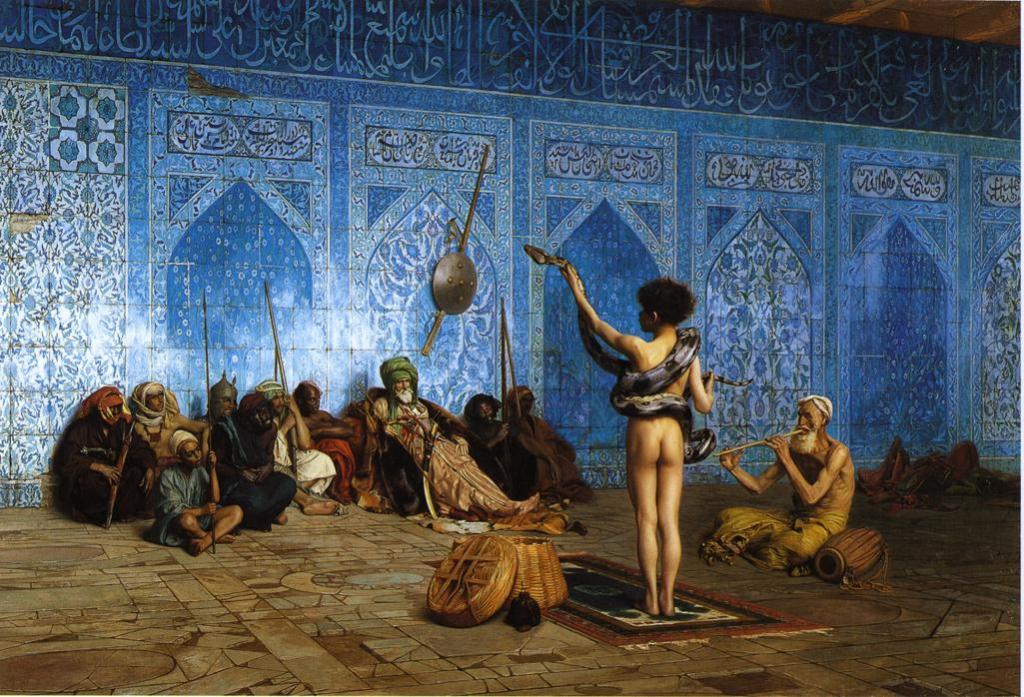Serge Lutens’ Pleasure Dome: Musc Koublai Khan


In Edward Said’s celebrated book, Orientalism, he discusses the ways in which Europeans–particularly the French and the British–imagined the East in its literature, art, and journalistic discourse, as a means of fully defining the Occident, or the West. By creating an image of the “Orient” as exotic, with its languid and eroticized culture, Europeans could imagine themselves as a rational and civilizing force whose mission was to subjugate those deemed to be “Others” to establish colonies and vast empires that would give them access to natural resources and cheap labor to achieve a kind of wealth that would sustain the growth of their industrial and capitalist societies.
Intrepid travelers such as the Venetian Marco Polo went as far as China and brought back many years of journals that would paint a lasting portrait of what we know now as the Middle East and Asia. The force of Polo’s recounting of his experience upon the European imaginary simply cannot be measured. He remained in China for seventeen years as an advisor to Genghis Khan, the fearsome Mongol leader who was the grandfather to Kubla Khan. Kubla followed in his grandfather’s footsteps in expanding the already vast empire, and with architects designed Xanadu, a famed city of sensual delights located in what is now Inner Mongolia. The Romantic British poet Samuel Taylor Coleridge (1772-1834) awoke one morning in an opium-induced fever dream, and wrote a poem published in 1816 about this Yuan dynasty emperor and his “pleasure dome”:
In Xanadu did Kubla Khan
A stately pleasure-dome decree:
Where Alph, the sacred river, ran
Through caverns measureless to man
Down to a sunless sea.(1)
In the poem, Coleridge makes reference to sights and scents:
So twice five miles of fertile ground
With walls and towers were girdled round:
And there were gardens bright with sinuous rills,
Where blossomed many an incense-bearing tree;
And here were forests ancient as the hills,
Enfolding sunny spots of greenery.(2)
The city of Xanadu no longer exists having been destroyed by the armies of the Ming Dynasty in 1369. Through Coleridge’s poetry, the story of Kubla Khan is told by generation after generation, alive in our imaginations. Clearly, Serge Lutens and Christopher Sheldrake, the creators of the perfume Musc Koublai Khan, were similarly inspired.

The online niche fragrance shop, Luckyscent, describes the perfume with these ecstatic words:
Musk, highly evocative of the most extraordinary scents imaginable; China, precious gold, opium dens. Refinement, cruelty… senses complex in their contradictions… Koublaï Khän, the Great Mongol ruler, Emperor of China. This Son of Heaven had a hill raised in the grounds of his palace, on top of which stood a lacquer and jade contemplation pavilion. The mound was planted with rare trees, kept green whatever the season. The ground was covered with glistening malachite and lapis lazuli particles… a coating of crystal. Muscs Koublaï Khän – a sensual, undulating aura. An animalesque scent.(3)
One would think that the colonial imaginary would have disappeared with the wars that created independence for colonies in Africa, the Middle East, and Asia, and that this way of thinking about the world would be deemed politically incorrect. Somehow, it still lives on in the perfume world. In the auratic narratives Serge Lutens’ creates to sell his expensive perfumes, the Middle East is a great inspiration. Another Luten’s perfume called Chergui is named after a fierce wind that sweeps across the deserts of Africa, and Luckyscent once again waxes jubilantly over another Lutens perfume, Ambre Sultan:
It’s a trip to a Bedouin tent in a desert far away and stealing a look inside…thick incense burning on coal with spices filling the air, mysterious eyes flashing and a very real feeling that you’ve never smelled anything like this magnificent amber perfume before. A devilishly dark aroma that goes beyond sensual or coy, Ambre Sultan is flat out oozing sexuality, deeply exotic and utterly, totally and completely unforgettable. Once you smell it, it will haunt your dreams until you find your way back to it.(4)
Perfumes act upon our experiences and memories. I love incense because it reminds me of Buddhist temples; I love rose because it reminds me of my mother’s garden. But is it okay to market a product based on a rather violent history of subjugation and oppression? Do we buy into the fantasy of colonization when we buy a Luten’s scent?
I really like Lutens perfumes. They are masterful creations. However, I have a hard time swallowing the storyline that is used to sell it. Can we give the exoticism a break?